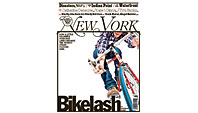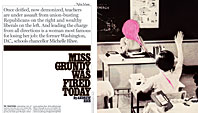
1. Matthew Shaer’s cover story about the culture war over Mayor Bloomberg’s bike lanes (“Not Quite ÂCopenhagen,†March 28) provoked a response from City Hall. Deputy Mayor Howard Wolfson not only released a memo citing safety statistics that bolster the case for bike lanes; he also blogged for the Huffington Post about how, in the well-organized New York of tomorrow, there’ll be room enough for drivers, walkers, users of public transportation, and, of course, cyclists. In an attempt to defuse a central observation of the story, that the fight has stirred up the irrational subconscious of the citizenry, he wrote: “To paraphrase that great cyclist Sigmund Freud, sometimes a bike lane is just a bike lane.â€Others, like the website Gothamist, savored the civic irrationality, writing, “The in-depth article is full of reasonable, circumspect, and totally-not-paranoid statements from both sides of the debate … [Transportation Commissioner Janette] Sadik-Khan is playing God with the bike lanes, which are the same as 9/11 and the grand contested Âelection of 2000. But doesn’t anybody see the connection between all this and the Holocaust?! And why won’t Sadik-Khan just settle this controversy by releasing her birth certificate? Think about it.†This was in reference to a statement made in the piece by Jack Brown of the Coalition Against Rogue Riding, in which he compared aggressive bikers to 9/11. (Brown himself wrote in to clarify that he “did not tell the fact-checker that 9/11 was ‘equivalent to Bike Bedlam.’ I said it was ‘similar but different.’ â€) Overall, commenters came out in favor of the lanes. But many pedal pushers seemed to find the battle wearing. “Enjoy New York Magazine and their love affair with two stone-age-minded cranks,†Bike Blog NYC noted, quietly shaking its blog-head. Or, as the Infrastructuralist blog put it, “it certainly makes for good copy, discussing all the overzealous, obsessive behavior on both sides. But lost amid all the bombast and anger and ideological sermonizing is the larger issue of urbanism and transportation—and how we plan to get ourselves, and future generations, from place to place in the coming years.â€

2. Andrew Rice’s profile of the former Washington, D.C., schools chancellor Michelle Rhee and her well-funded crusade to reform teachers unions (“Miss ÂGrundy Was ÂFired ÂToday,†March 28) got a gold star from Scholastic’s This Week in Education blog for its insight into StudentsFirst, the organization Rhee is building that is modeled after the NRA, and for disclosing that Rhee opposed the bill in Wisconsin that stripped teachers of collective-bargaining rights. But the blogger was frustrated by the fact that “I know what she’s against, but I want to know more about what she’s for, and I want a better sense of exactly how she aims to accomplish it.†Many other readers were quick to grade Rhee based on whatever criteria they’d already included in their ideological curricula. “Over the past 30 years we’ve done everything the unions asked—better pay, lower teacher/student ratios, increased funding for the physical plant,†wrote one commenter on nymag.com. “And yet what do we have to show for it? Where are the gains? That leaves us with a choice—continue on the unsuccessful path we are on, or change direction.†Another commenter was ready to expel many teachers over their supposedly resentful attitudes, contending that “while some are great people who love kids and focus on doing what they can to maximize the students’ educational experience, some are horrors who delight in telling us stories about the ‘monsters’ they are charged with teaching, the ‘idiot’ parents, etc. These people keep teaching because it pays well—for those with seniority—and they don’t believe that they have any other career options. They simply occupy that position waiting to retire.†Rhee’s opponents were just as willing to flunk her. “Ms. Rhee, along with the plutocracy, of which she is a member, care nothing for kids, teachers, or the public schools in this country. Their ‘concern’ is nothing more than a smoke screen for their desire to destroy a system which they do not use, thus do not want to pay for. This woman is an abomination and a phony,†a commenter wrote on nymag.com, while another gave her a demerit for hypocrisy, observing that it’s “odd that someone who has devoted her life to the cause of teaching doesn’t believe that teachers can be taught to do their jobs better.†Another commenter pointed out that “unions protect good teachers, too. Sometimes the best teachers are also outspoken and therefore not appreciated by bad administrators, who have the power to fire them—but the union provides the right to a fair hearing… All this union busting is not about getting better teachers—it’s about getting cheaper, less experienced teachers.†Walt Gardner, a writer for Education Week, went for the extra credit, theorizing that “Michelle Rhee is a phenomenon today largely because of the media’s complicity. By repeating her wholesale charge that public schools are failing, reporters and commentators lend credibility to what is a distortion of reality … Public schools range from excellent to execrable. But to hear her speak is to believe that a radical change is needed in all schools.â€
Send correspondence to: nymletters@nymag.com